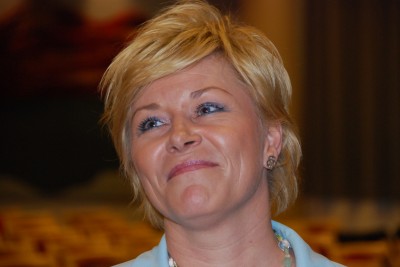With local elections due across the country on September 11 and 12, Norwegians and their political representatives are discussing how the election campaign and sensitive debates, including those around immigration and integration, will be carried out following the attacks on Oslo and Utøya island.

Prime Minister Jens Stoltenberg has warned against a “witch-hunt against opinions” following the attacks, using his speech to parliament on Monday to suggest that no opinions should be declared “illegal.” Nonetheless, many believe that Norway’s politicians, particularly the often controversial Progress Party, will have to modify their rhetoric in future.
Breivik’s views ‘uncomfortable’ for some
Anders Todal Jenssen, an election researcher, has told Norwegian Broadcasting (NRK) that “the justifications of Anders Behring Breivik will remind people so much of how they themselves have argued that they will feel uncomfortable,” especially the anti-immigration Progress Party, of which Breivik was previously a member.
Prime Minister Stoltenberg also addressed this in parliament after his speech, telling NRK that “it should be legal to disagree, also when it comes to, for example, immigration policy,” although he added that “we must all think through how we take part in the debate.” The Progress Party’s leader, Siv Jensen, told NRK that “Stoltenberg spoke on behalf of us all, and I think we all agree.” She praised the Prime Minister, a long-standing political opponent, as “fantastic” and “statesmanlike” when speaking to Aftenposten. She stressed to NRK that “the time we have in front of us calls for even more freedom of speech, and not less.”
‘New form of debate’
Nonetheless, Jensen has acknowledged that certain things will change. In an interview given to Aftenposten, Jensen commented that what has happened will lead to “a completely new form of debate in Norway.” She said that “everyone has a responsibility for how they articulate themselves, both now and going forward.” Nevertheless, she stressed that “the only thing I am sure about is that we will not have less freedom of speech in Norway.” “I am not going to duck uncomfortable debates,” she emphasized, although she added that “all parties are going to think through a lot” when it comes to the debate on immigration.
Jensen rejected claims that her party had focused too much on the threat of Islamist terror to the detriment of attempts to tackle far right extremism, and would not speculate on how her party would have reacted had the attacks come from Muslims. She refused to comment on whether she now understood had some Muslims felt when they were associated with terrorists by her party and others, and also refused to comment on her earlier speeches that have claimed that Norway is undergoing “creeping Islamization.” She did say that she was “scared stiff of making a ‘slip of the tongue'” following the attacks.
Jensen has already been criticized for her choice of words in the aftermath of the attacks, when she appeared to say that making connections between her party and Breivik was as bad as the terrorist attacks themselves. Jensen told NRK during questioning from reporters just days after the events, “I think what has happened is disgusting, but I think it is just as disgusting that certain media try to draw a connection between this man’s atrocity and the Progress Party.” Jensen apologized “if people interpreted it in this way,” describing the incident as a “misunderstanding.” She said she was “frightfully sorry” about it, explaining that “what I said was about accusations from a Swedish journalist.” She added, “please, I have had demanding days and many interviews.”
‘Not ashamed’
Jensen further told Aftenposten that her party “had nothing to be ashamed of” and would not go into whether she regretted anything she had said in the past about Islam. When speaking to newspaper VG, Jensen did admit that it was “certain” she would regret things she had said publicly in the past. She also stated that she and other politicians must be careful in their use of words over the elections so that they are not “put forward as support” for Breivik’s views. She nonetheless stressed that for the moment, she was concentrating on remembrance and grief.
Speaking on Breivik’s earlier participation in her party, Jensen said that it had “if possible” made her “even sadder.” But she claimed that Breivik “said nothing, did nothing, did not participate and disappeared,” adding that there was “no-one” in the party that wanted to be associated with his actions.
Local Progress Party politicians also reacted to the situation. Svenn Kristiansen, for example, told VG that he would never have used the phrase “creeping Islamization” that Jensen introduced into the political discourse, commenting that the party must present its programme in a “proper fashion.” Another Progress Party local politician, Knut Hanselmann, went further, suggesting that the party needs “a different type of discussion when it comes to immigration.” Hanselmann in particular pointed to an article in Aftenposten by Christian Tybring-Gjedde, a parliamentary representative of the party, that described multiculturalism as “idiotic in the long-term” and something that would “tear our country to pieces.” The same article also attacked the Labour Party for “treachery,” using words or phrases similar to those later used by Breivik.
Views and News from Norway/Aled-Dilwyn Fisher
Join our Readers’ Forum or comment below.
To support our news service, please click the “Donate” button now.

